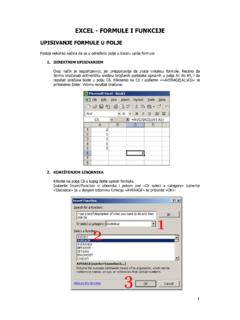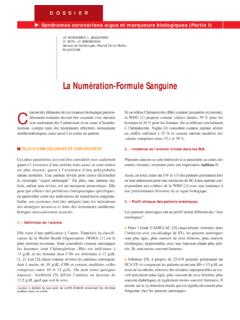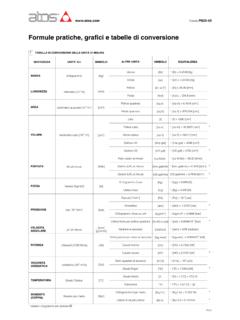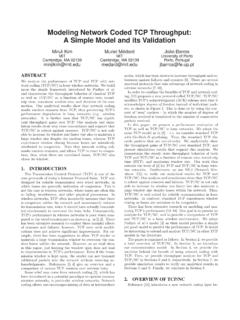Transcription of We'd Better Watch Out
1 MANUFACTURING MATTERSThe Mythof the Post-Ind4stricl Stephen S. Cohen and John and Charts. 297 pp. Nerr York:A Council on F or eign Relations Book /Basic Books. $1 Robert M. SolowIF HERE is a lot of loose talk about the "deindus-I trialization" of the United States economy. WeI are losing our manufacturing industry to for-I eigners and becoming a "service economy" (ifyou like the idea) or a "nation of hamburger stands andinsurance companies" (if you don't like the idea). Ste-phen S. Cohen and John Zysman tregin their book,"Manufacturing Matters: The Myth of the Post-Indus-trial Economy," by insisting, quite correctly, that nosuch thing can happen.
2 The orders of magnitude aresuch that the United States could not hope to pay for itsmanufacturing imports by selling seryices abroad. weneed too many goods, and there are not enough serv-ices. One way or another we will continue to be of goods, including manufactures, and probablynet exporters of goods in order to pay interest on thedebts we have incurred during the consumption bingeof the 1980' That doesn't make things all right. We could ofcourse balance our trade - and we will - by deprecia-tion of our currency and reductions in our real is no trick to that.
3 Every country that is so poorand so unpromising that no one will lend to it balancesits trade, precisely by being so poor that it cannot af-ford to import more than it can pay for by what it exports are the products of cheap labor. IfAmerican manufacturing is to win back a competitiveedge against Japan, South Korea and West Germany, itwill have to find a way to sell goods here, there and inthird markets while paying high wages and earning agood return on investment. That can only happen if wecatch up with, and at least sometimes surpass, ourrivals in productivity, quality and authors also make the probably valid pointthat, even if it were otherwise possible, the notion of a"post-industrial" economy fails against the modern, high-productivity business services arereally inseparable from the production of the goodsthey service.
4 The free-floating service sector will soonlose touch and the new producer will soon part of the argument is convincingly Mr. Cohen and Mr. Zysman come to explain WhatRobert M. Solow is a professor of economics at theMassachusetts Institute of 'd Better Watch OutWent Wrong with the United States manufacturing in-dustry they have some interesting and reasonablethings to say, but they also begin to flail around a tell war stories, they go in for heavy breathing(Revolutions and Transformations come thick andfast), they profess confidence about things no one canpossibly know and they fall into vagueness.
5 Here is arepresentative example: "Those firms that understand,invent and implement thre new possibilities of theemerging telecommunications technology will gain ad-vantage. Critically, corporate strategies at home andabroad will use the possibilities of the new technology tocapture competitive advantage. We cannot, of course,demonstrate how technologies that are only nowemerging will alter strategies in ways yet to be imag-ined," A passage like that is not wrong; but it only ap-pears to be saying is a different sort of example. Alter 100 pagesthe authors announce "six h]?
6 Otheses that will be usedas premises from here on in.. First, technologicaldevelopments can provoJ<e rapid market shifts. Second,technologies are shaped by the needs and arrange-ments that exist in the nations from which they , some critical technologies can affect the com-petitive position of a whole range of industries; and ifone nation uses these technologies to gain a lead in avital product, it can forge an important trade advan-tage for itself. These are strategic transformative in-dustries." The other three "hypotheses" are all respect, these are truisms, not h)?
7 A way, I do not blame Mr. Cohen and Mr. Zys-man, directors of the Berkeley Roundtable on the Inter-national Economy at the University of California, forfalling into bad habits. They want to appear to be gener-alizing about a subject on which there are too few (orwhat is almost the same thing, too many) defensiblegeneralizations. It is just a pity that they cannot be con-tent with the odd insight, the occasional plausible anddiscussable hJrpothesis. They do, in fact, produce someof those. They are interesting, for example, on the needfor flexibility and adaptability in modern manufactur-ing requiled to give a rich, knowledgeable and finickymarket what it wants when it wants it, quite the oppo-site of the mass-production philosophy that madeAmerica great.
8 There are other good moments. Thetrouble is that they do not know, any more than I do, ex-actly what let Japan and West Germany overtakeUnited States industry. They should be content to tell afew good stories and give the reader furiously to do fault them for one cop-out. One of their centralbeliefs is that there has been a Revolution in manufac-turing, its name is Programmable Automation, andthat American industry has failed to capitalize on may even be so. But then they go on, "We do notneed to show that the new technologies produce a breakwith past patterns of productivity growth.
9 LThat]would depend not just on the possibilities the technolo-gies represent, but rather on how effectively (hey areused." What this means is that they, like everyone else,are somewhat embarrassed by the fact that whateveryone feels to have been a technological revolution,a drastic change in our productive lives, has been ac-companied everywhere, including Japan, by a slowing-down of productivity growth, not by a step up. You cansee the computer age ever]rwhere but in the produc-tivity authors also put some emphasis on the or-ganization of skilled work in factories, and onthe education of production-oriented engineersand executives.)
10 They mention the intriguingpossibility that inattention to quality is a hangover fromthe age of mass production. But these side remarksonly undermine the claim to generality, to a grandscheme. I would have been happier with some wellde-served public policy, Mr. Cohen and Mr. Zysman havevery little to say. They offer the advice that a hands-offpolicy is both impossible and undesirable. They suggestthat public policy ought to be directed positively towardencouraging and assisting the achievement of indus-trial competitiveness. They suspect, probably rightly,that the United States Government has allowed itself totre flimflammed by the Japanese for years on the mat-ter of nontariff barriers, and ought to play a little hard-ball.








